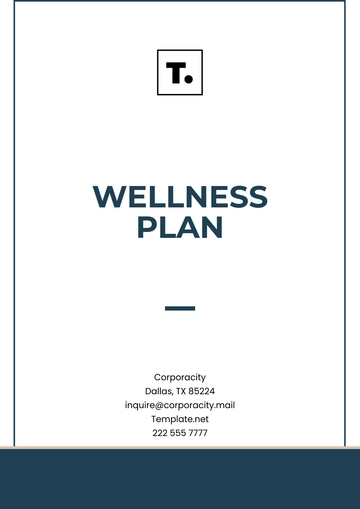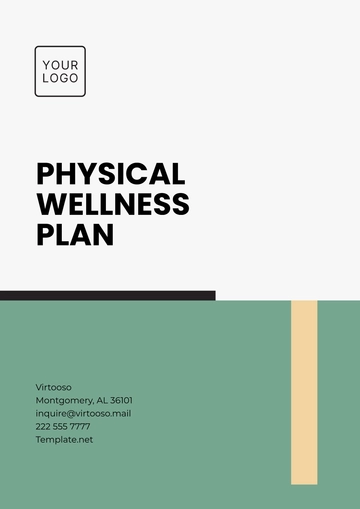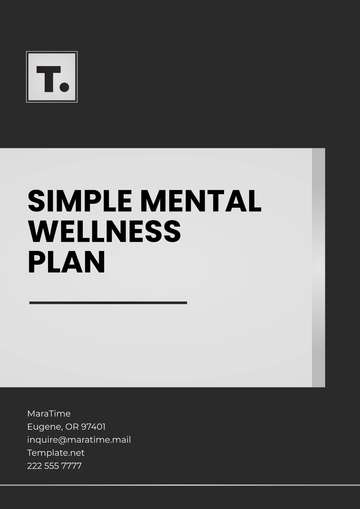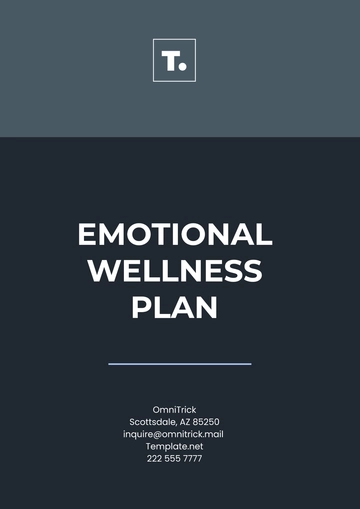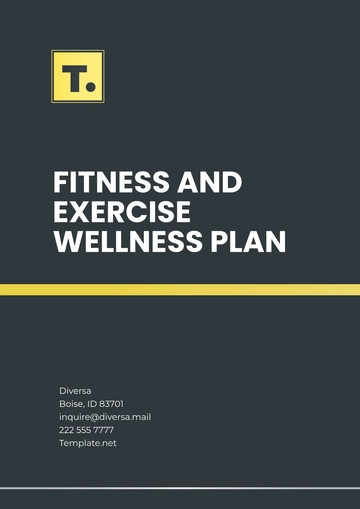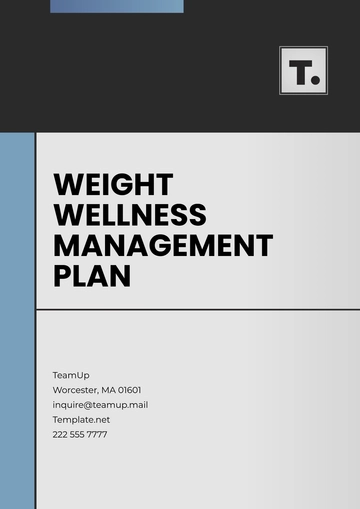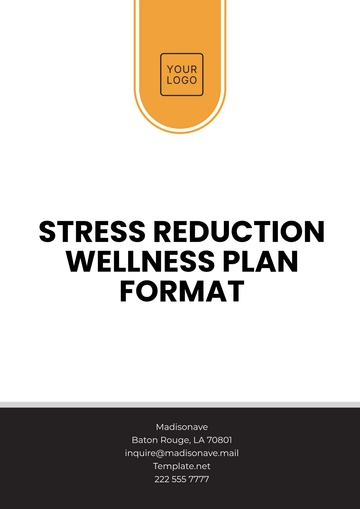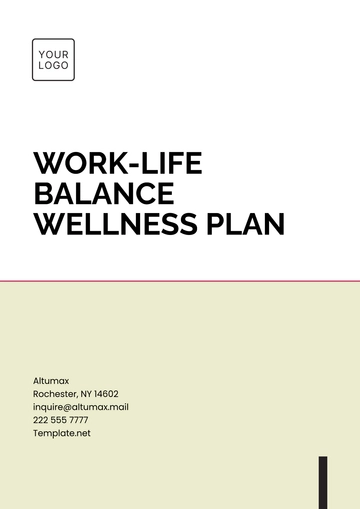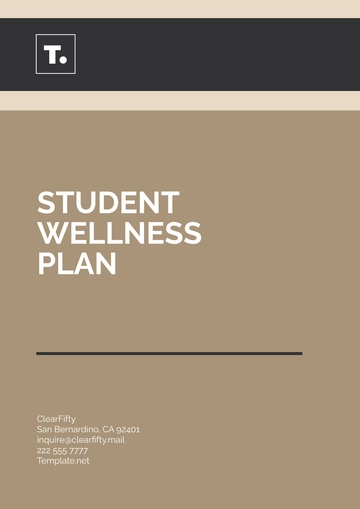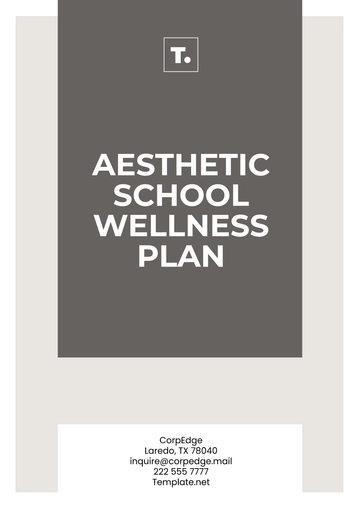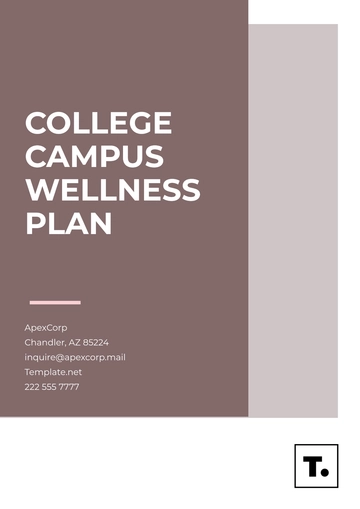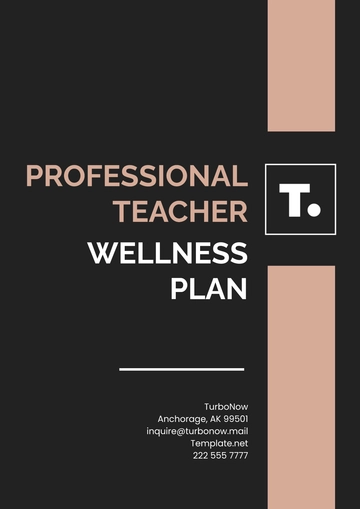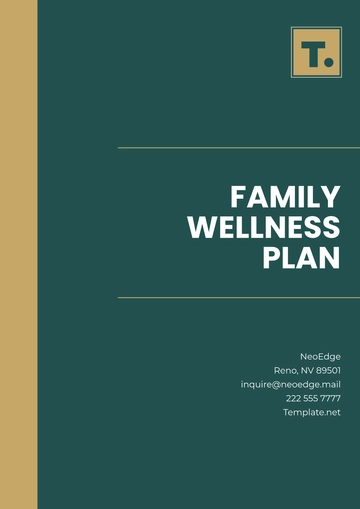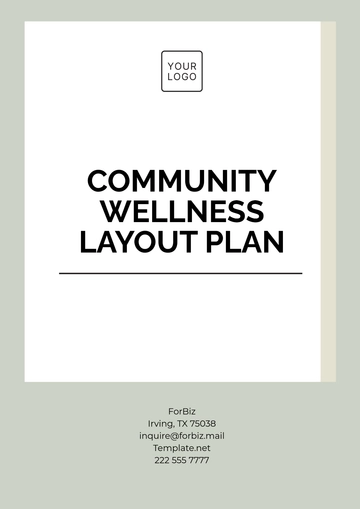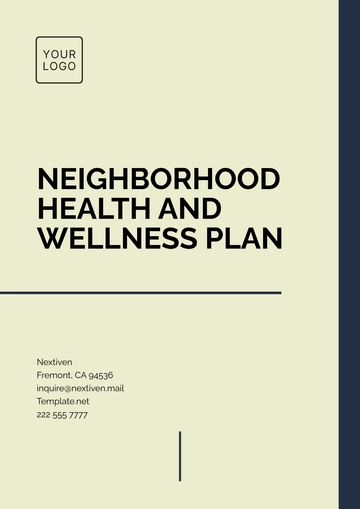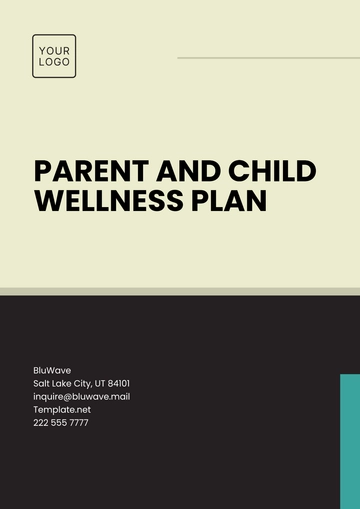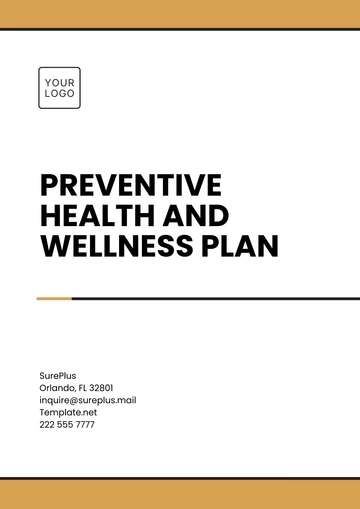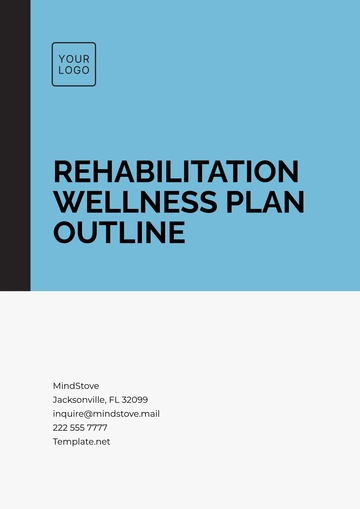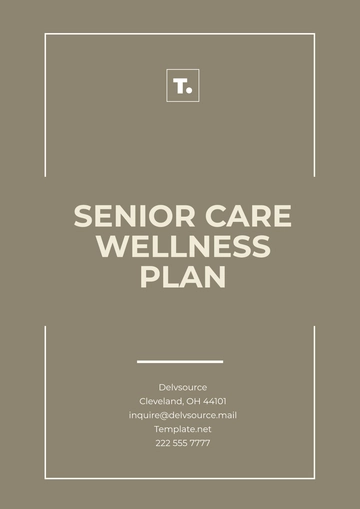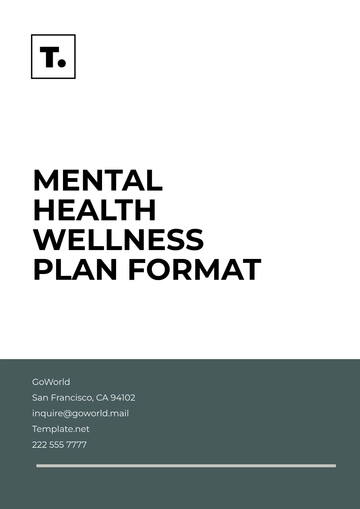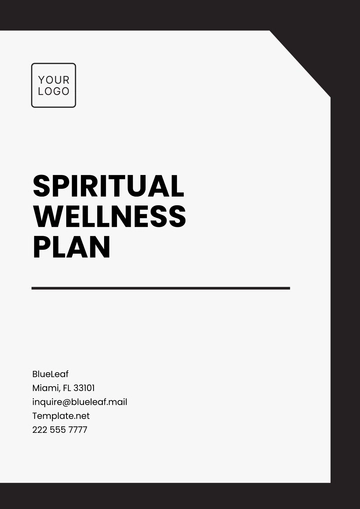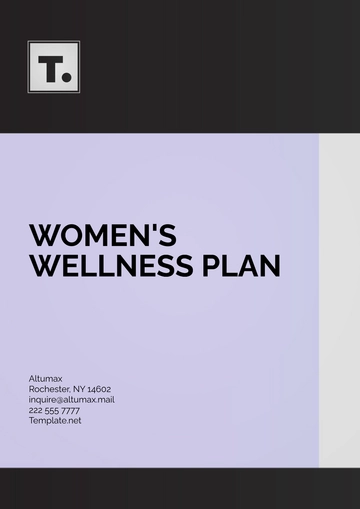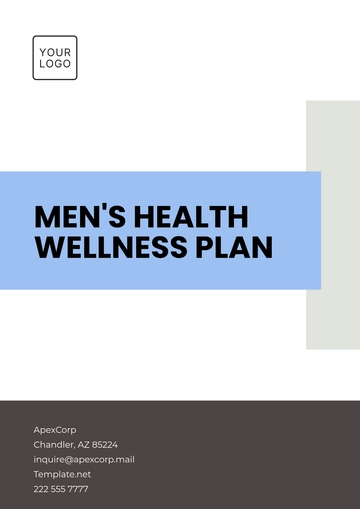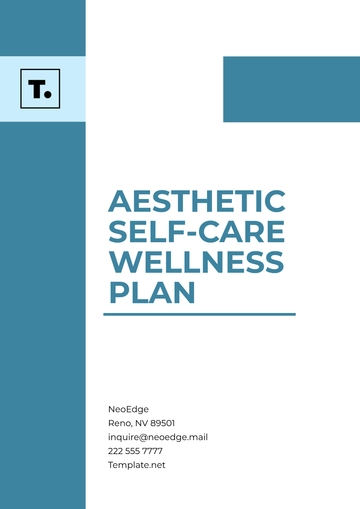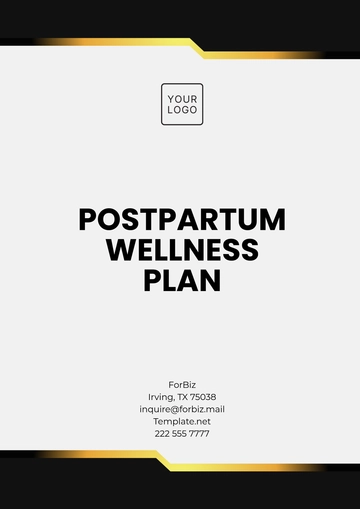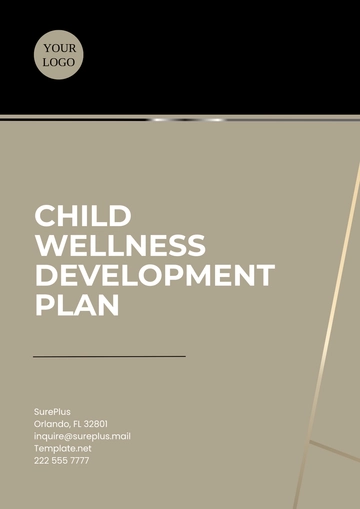Free College Athlete Wellness Plan
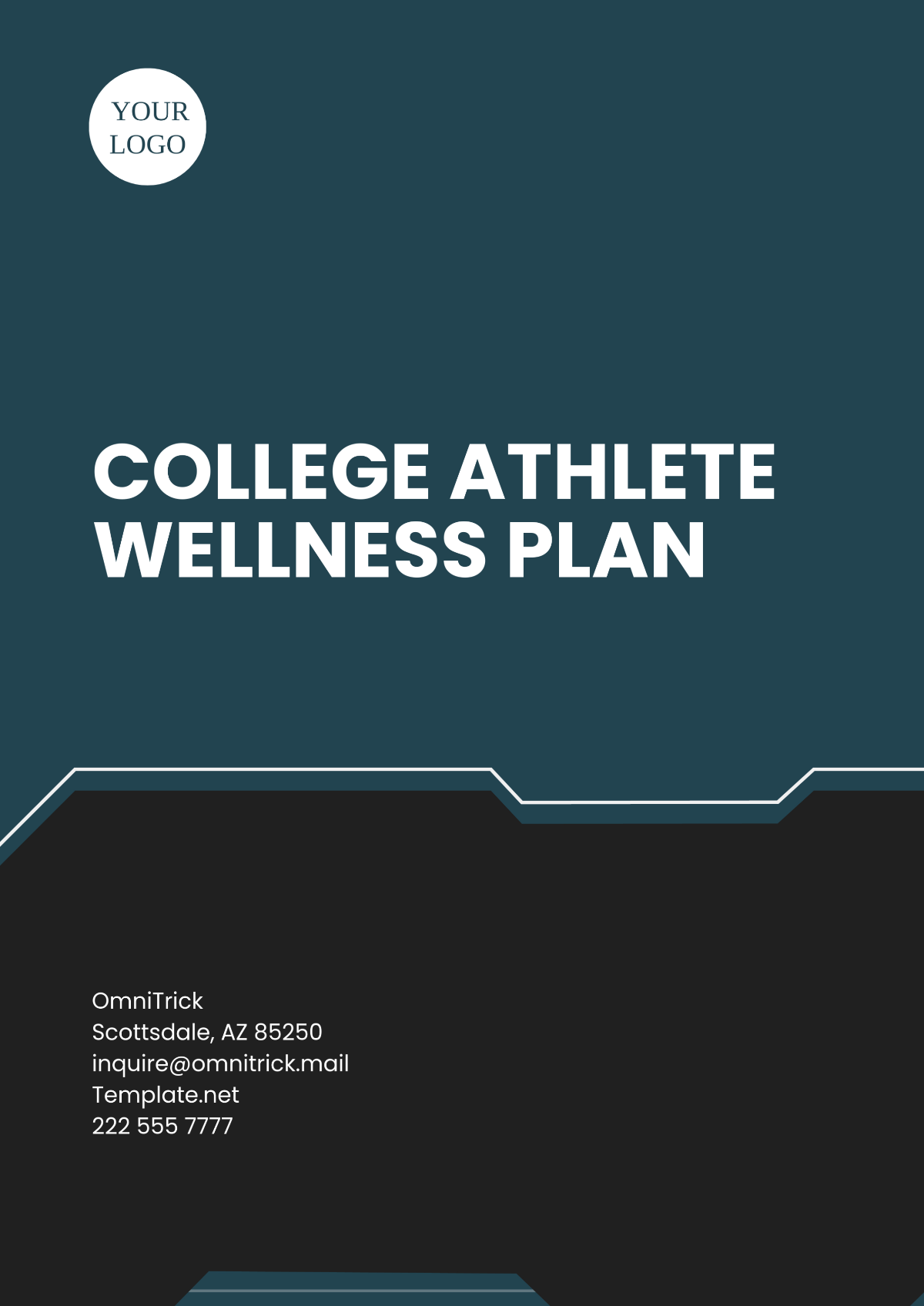
Prepared by: [Your Name]
Company: [Your Company Name]
Date: [Insert Date]
I. Introduction
College athletes are under significant pressure, balancing rigorous academic schedules with demanding sports commitments. The College Athlete Wellness Plan is designed to promote a holistic approach to health and wellness, helping athletes excel both on the field and in the classroom. This plan focuses on optimizing physical health, mental well-being, nutritional support, injury prevention, recovery, and emotional resilience to ensure college athletes thrive in all aspects of their lives.
II. Objectives
Enhance Physical Health and Performance
Support athletes in achieving peak physical performance through training, recovery, and injury prevention.Optimize Nutrition and Hydration
Promote proper dietary habits to fuel performance, support recovery, and maintain overall health.Improve Mental Health and Resilience
Provide strategies to manage stress, prevent burnout, and maintain a healthy balance between academics and athletics.Support Injury Prevention and Recovery
Encourage practices that minimize the risk of injury and promote fast, effective recovery in case of setbacks.Foster Personal Growth and Time Management Skills
Help athletes develop strong time management skills and a sense of self-worth beyond their athletic performance.
III. Key Components of the Plan
A. Physical Health and Performance
Strategies:
Training Program:
Develop a sport-specific training program that includes strength, agility, flexibility, and endurance training.
Include periodization in training to ensure athletes peak at the right time and avoid overtraining.
Incorporate both individual and team-focused drills to improve technique, teamwork, and performance under pressure.
Physical Activity:
Include cross-training activities such as swimming, cycling, or yoga to prevent overuse injuries and maintain cardiovascular fitness.
Encourage regular stretching, foam rolling, and mobility exercises to improve flexibility and reduce muscle tightness.
Incorporate rest days and active recovery to allow muscles to repair and regenerate.
Sleep and Recovery:
Prioritize 7-9 hours of sleep per night to allow the body to repair and the brain to recover.
Introduce relaxation techniques such as deep breathing, meditation, or progressive muscle relaxation to improve sleep quality.
Encourage nap times when possible, especially following intense training or competitions.
B. Nutrition and Hydration
Strategies:
Balanced Diet:
Emphasize a well-rounded diet that includes lean proteins, whole grains, fruits, vegetables, and healthy fats to fuel both athletic performance and recovery.
Work with sports nutritionists to create individualized meal plans that meet each athlete's energy needs, taking into account training volume, body composition goals, and sport-specific demands.
Pre- and Post-Workout Nutrition:
Ensure athletes consume carbohydrates and protein before and after workouts to fuel energy needs and support muscle repair.
Examples: Pre-workout: Whole grain toast with peanut butter; Post-workout: Protein smoothie with fruit and spinach.
Hydration:
Encourage athletes to drink water consistently throughout the day, aiming for at least 3 liters of water per day.
Recommend electrolyte replacement beverages during long training sessions or competitions to maintain fluid balance.
Educate on signs of dehydration (e.g., dark urine, dry mouth, dizziness) and the importance of hydration for peak performance.
Supplements (if applicable):
Recommend supplements only after thorough consultation with a physician or dietitian.
Common supplements for athletes might include multivitamins, protein powders, omega-3 fatty acids, or vitamin D, depending on individual needs.
C. Mental Health and Resilience
Strategies:
Stress Management:
Teach stress-reducing techniques such as mindfulness, meditation, and deep breathing exercises to help athletes manage the pressures of academics and competition.
Introduce time management strategies to balance school, sports, and social life. For example, breaking large tasks into manageable steps or prioritizing tasks.
Mental Health Awareness:
Provide access to on-campus counseling services, sports psychologists, or mental health professionals who specialize in athlete well-being.
Encourage open discussions about mental health, reducing stigma around seeking help when experiencing anxiety, depression, or burnout.
Foster a team culture that promotes mental resilience, with athletes supporting each other in and out of competition.
Visualization and Mental Preparation:
Implement mental conditioning practices, such as visualization techniques, to help athletes mentally prepare for competition and stay focused during high-pressure situations.
Encourage athletes to visualize successful performances, see themselves achieving goals, and manage pre-competition nerves.
Work-Life Balance:
Promote healthy boundaries between academics, sports, and personal time.
Ensure athletes have time to socialize, engage in hobbies, and relax to maintain a balanced life.
D. Injury Prevention and Recovery
Strategies:
Warm-Up and Cool-Down:
Incorporate dynamic warm-ups before training and games to increase blood flow and prepare muscles for physical activity.
Include static stretching and foam rolling as part of the cool-down process to promote flexibility and muscle recovery.
Injury Prevention:
Provide education on proper biomechanics and posture during training and competition to minimize the risk of injury.
Encourage athletes to listen to their bodies and avoid pushing through pain.
Introduce exercises to strengthen weak areas or muscles prone to injury, such as ankle stability drills for runners or rotator cuff exercises for swimmers.
Recovery Strategies:
Encourage the use of ice baths, contrast baths, or cryotherapy to reduce muscle inflammation and accelerate recovery.
Recommend massage therapy or chiropractic care to address muscle tightness or alignment issues.
Utilize active recovery techniques, such as walking, light cycling, or yoga, to promote blood flow without stressing the body.
Injury Rehabilitation:
Develop personalized rehabilitation programs for athletes recovering from injuries, working closely with physiotherapists, athletic trainers, and other medical professionals.
Encourage athletes to follow a gradual return-to-play protocol after injury to ensure a full recovery before resuming intense physical activity.
E. Personal Growth and Time Management
Strategies:
Time Management:
Help athletes develop effective time management skills, such as using planners or digital calendars to schedule training sessions, academic deadlines, and personal activities.
Encourage a "prioritization" strategy, focusing on the most important tasks first, and allocating time for rest.
Academic Support:
Ensure athletes have access to academic advisors, tutors, and other resources to help manage their coursework and maintain a high GPA.
Encourage regular communication with professors to address any concerns about missing class or assignments due to athletic commitments.
Developing a Growth Mindset:
Foster a growth mindset, where athletes understand that success comes from hard work, persistence, and learning from mistakes.
Provide mentorship programs where upperclassmen athletes can guide freshmen through the college experience, both academically and athletically.
Career Development:
Provide career counseling or internships that help athletes develop professional skills outside of their sport.
Encourage athletes to explore career options that align with their passions and interests, ensuring they have a well-rounded college experience.
IV. Implementation Timeline
Phase 1 (Pre-Season):
Focus on building a strong physical foundation through strength, conditioning, and nutrition planning.
Work on stress management techniques, time management skills, and mental health strategies to prepare for the upcoming season.
Phase 2 (In-Season):
Maintain peak performance through regular training and competition schedules.
Emphasize recovery, injury prevention, and balancing academics with athletic demands.
Continue mental health support and stress management practices during the season.
Phase 3 (Post-Season):
Focus on recovery and injury rehabilitation after the season’s end.
Use the off-season to build strength and endurance while reducing the intensity of training.
Continue mental health and stress-relief practices to prevent burnout and maintain overall wellness.
V. Monitoring and Evaluation
A. Key Performance Indicators (KPIs)
Improvement in athletic performance, including strength, speed, endurance, and technical skills.
Consistent adherence to nutrition and hydration plans.
Reduced injury incidence and faster recovery times.
Academic success, with a focus on GPA and course completion.
Mental health and emotional resilience, as indicated by stress levels and feedback from mental health resources.
B. Evaluation Methods
Regular check-ins with coaches, sports psychologists, athletic trainers, and academic advisors.
Athlete self-assessments on physical and mental well-being.
Monthly progress reports on athletic performance and recovery.
VI. Conclusion
The College Athlete Wellness Plan takes a comprehensive approach to support athletes in excelling both on the field and in their personal lives. By focusing on physical health, mental well-being, injury prevention, and personal growth, this plan ensures that athletes can perform at their best while maintaining balance and avoiding burnout. Consistent evaluation, support, and engagement with athletes will help them thrive during their college years and beyond.
- 100% Customizable, free editor
- Access 1 Million+ Templates, photo’s & graphics
- Download or share as a template
- Click and replace photos, graphics, text, backgrounds
- Resize, crop, AI write & more
- Access advanced editor
You may also like
- Finance Plan
- Construction Plan
- Sales Plan
- Development Plan
- Career Plan
- Budget Plan
- HR Plan
- Education Plan
- Transition Plan
- Work Plan
- Training Plan
- Communication Plan
- Operation Plan
- Health And Safety Plan
- Strategy Plan
- Professional Development Plan
- Advertising Plan
- Risk Management Plan
- Restaurant Plan
- School Plan
- Nursing Home Patient Care Plan
- Nursing Care Plan
- Plan Event
- Startup Plan
- Social Media Plan
- Staffing Plan
- Annual Plan
- Content Plan
- Payment Plan
- Implementation Plan
- Hotel Plan
- Workout Plan
- Accounting Plan
- Campaign Plan
- Essay Plan
- 30 60 90 Day Plan
- Research Plan
- Recruitment Plan
- 90 Day Plan
- Quarterly Plan
- Emergency Plan
- 5 Year Plan
- Gym Plan
- Personal Plan
- IT and Software Plan
- Treatment Plan
- Real Estate Plan
- Law Firm Plan
- Healthcare Plan
- Improvement Plan
- Media Plan
- 5 Year Business Plan
- Learning Plan
- Marketing Campaign Plan
- Travel Agency Plan
- Cleaning Services Plan
- Interior Design Plan
- Performance Plan
- PR Plan
- Birth Plan
- Life Plan
- SEO Plan
- Disaster Recovery Plan
- Continuity Plan
- Launch Plan
- Legal Plan
- Behavior Plan
- Performance Improvement Plan
- Salon Plan
- Security Plan
- Security Management Plan
- Employee Development Plan
- Quality Plan
- Service Improvement Plan
- Growth Plan
- Incident Response Plan
- Basketball Plan
- Emergency Action Plan
- Product Launch Plan
- Spa Plan
- Employee Training Plan
- Data Analysis Plan
- Employee Action Plan
- Territory Plan
- Audit Plan
- Classroom Plan
- Activity Plan
- Parenting Plan
- Care Plan
- Project Execution Plan
- Exercise Plan
- Internship Plan
- Software Development Plan
- Continuous Improvement Plan
- Leave Plan
- 90 Day Sales Plan
- Advertising Agency Plan
- Employee Transition Plan
- Smart Action Plan
- Workplace Safety Plan
- Behavior Change Plan
- Contingency Plan
- Continuity of Operations Plan
- Health Plan
- Quality Control Plan
- Self Plan
- Sports Development Plan
- Change Management Plan
- Ecommerce Plan
- Personal Financial Plan
- Process Improvement Plan
- 30-60-90 Day Sales Plan
- Crisis Management Plan
- Engagement Plan
- Execution Plan
- Pandemic Plan
- Quality Assurance Plan
- Service Continuity Plan
- Agile Project Plan
- Fundraising Plan
- Job Transition Plan
- Asset Maintenance Plan
- Maintenance Plan
- Software Test Plan
- Staff Training and Development Plan
- 3 Year Plan
- Brand Activation Plan
- Release Plan
- Resource Plan
- Risk Mitigation Plan
- Teacher Plan
- 30 60 90 Day Plan for New Manager
- Food Safety Plan
- Food Truck Plan
- Hiring Plan
- Quality Management Plan
- Wellness Plan
- Behavior Intervention Plan
- Bonus Plan
- Investment Plan
- Maternity Leave Plan
- Pandemic Response Plan
- Succession Planning
- Coaching Plan
- Configuration Management Plan
- Remote Work Plan
- Self Care Plan
- Teaching Plan
- 100-Day Plan
- HACCP Plan
- Student Plan
- Sustainability Plan
- 30 60 90 Day Plan for Interview
- Access Plan
- Site Specific Safety Plan
